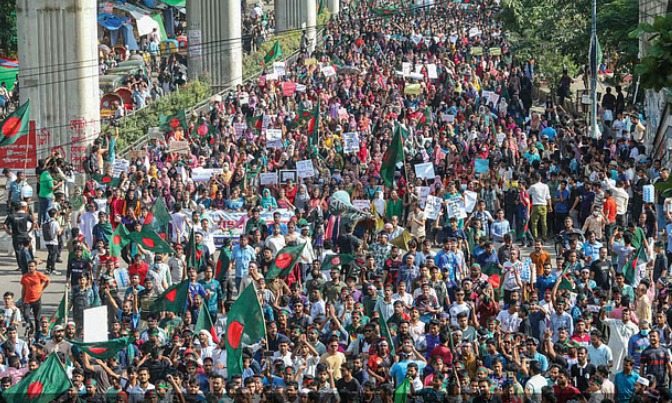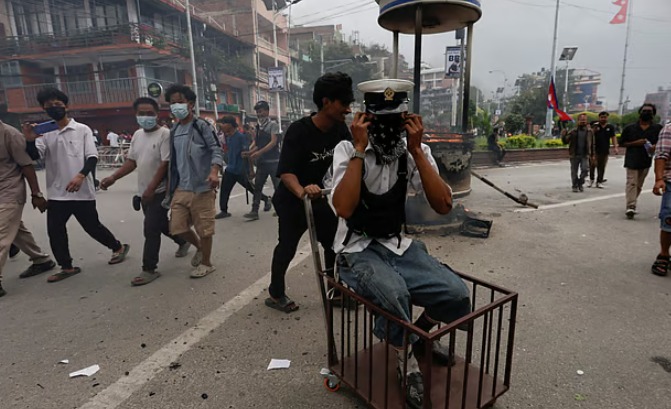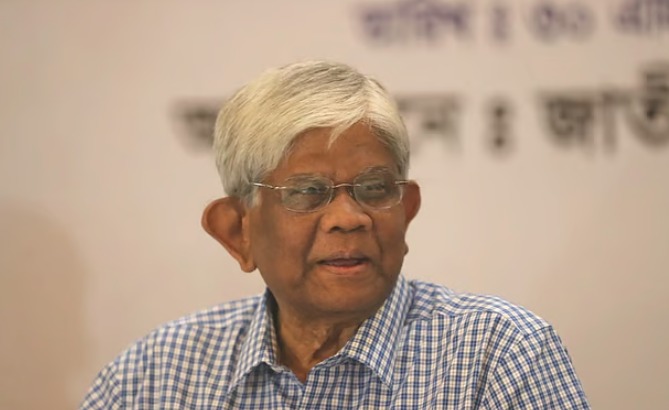DEsk Report,
188 expatriates who were imprisoned for participating in the march have returned home
In July last year, Omar Faruk, an expatriate from the United States, wrote on Facebook a strong pledge to “dedicate myself to building a new Bangladesh free from tyranny.” Ahsan Sani, an expatriate from Spain, made a similar post (comment) on Facebook. Many others like them were vocal not only on Facebook, but also on the streets in their own countries.
188 expatriates who were imprisoned for participating in the march have returned home
The expatriates had been expressing solidarity with the students’ movement to end discrimination in July-August last year from the very beginning. They have held various programs such as human chains, processions, and rallies in different countries around the world, including the United States, the United Kingdom, and Australia. They were vocal against the indiscriminate shootings, killings, torture, and mass arrests by the law enforcement forces loyal to the previous Awami League government.
At this event, remittance fighters will describe their experiences with the mass uprising. Two documentaries will be screened at the event. One of them is based on the movement of remittance fighters, while the other documentary will highlight the activities of expatriate online activists. Despite the risks, expatriates held a protest march in the United Arab Emirates, taking a stand in favor of the mass uprising. After being arrested from that march, many had to go to jail. Any kind of march and protest rally without permission is completely prohibited in the United Arab Emirates. The interim government has taken the initiative to release those who were imprisoned in the Emirates after marching. So far, 188 Bangladeshi workers have returned home after being released from prison in the United Arab Emirates.
The interim government will observe ‘Remittance Fighters Day’ on Saturday (August 2) to commemorate the contribution of expatriates to the student-people’s uprising. On this occasion, the Ministry of Expatriate Welfare and Overseas Employment has organized a special program this afternoon at the International Mother Language Institute in Segunbagicha in the capital. At this program, remittance fighters will describe their experiences with the mass uprising. Two documentaries will be screened at the event. One is on the movement of remittance fighters, while the other will highlight the activities of expatriate online activists.
Professor Asif Nazrul, Advisor to the Ministry of Expatriate Welfare and Overseas Employment, told Prothom Alo that expatriates played a very important role during the mass uprising. The government has made arrangements to give special honors to those who lost their jobs and returned to the country from the Middle East due to their solidarity with the mass uprising.
Expatriates in the United Arab Emirates protested on July 19 last year in solidarity with the student-public movement. The country’s law does not allow protests to be held without permission. 57 people were arrested in one case in connection with that protest. The police arrested 56 people in another case.
Release of expatriates is a priority for the government
During the July mass uprising, Bangladeshis who had succeeded in various fields from different parts of the world announced their return to the country through the hashtag ‘ReverseBrainDrainBD’ (bringing talented people back to the country) on Facebook. Expatriates took to the streets of various university campuses, highways, and even the streets of various cities in the Middle East with strict laws. London’s Trafalgar Square, New York’s Time Square, Paris’s Republic Square, Berlin, Milan, Tokyo, and Seoul were filled with the slogans of expatriates.
Expatriates in the United Arab Emirates protested on July 19 last year in solidarity with the student-public movement. The country’s law does not allow protests without permission. As a result of that protest, 57 people were arrested in one case. The police arrested 56 people in another case. However, they were released step by step after the country’s government pardoned them. Professor Muhammad Yunus, the chief advisor to the interim government, requested the release of the UAE expatriates.
Some expatriates who returned from the United Arab Emirates told Prothom Alo that there are still 23 people in prison in the country who participated in the movement.
The Ministry of Expatriates’ Welfare and Overseas Employment says that the issue of releasing and bringing back expatriates detained abroad was one of the priorities of the interim government. So far, 188 expatriate workers have been released from prison and returned to the country from the Middle East.
There are more than one million Bangladeshis in the United Arab Emirates. Of the 57 people arrested in the first round of protests in the country, three were sentenced to life imprisonment, 53 to 10 years, and one to 11 years. Later, on August 28 last year, Professor Muhammad Yunus, the chief advisor to the interim government, spoke on the phone with the country’s President Sheikh Mohammed bin Zayed Al Nahyan. He requested that the sentences of the Bangladeshis be commuted. The Emirates government responded to this. Later, the expatriates were released from prison and started returning home from the first week of September.
Some expatriates who returned from the United Arab Emirates told Prothom Alo that there are still about 23 people in prison in the country who participated in the movement.
Solidarity in the country
On July 15 last year, during the quota reform movement under the banner of the anti-discrimination student movement, the Chhatra League (now banned) attacked ordinary students. This incident created anger among the expatriates. On that day, four Bangladeshi students lit candles at the Shaheed Minar in Altab Ali Park in East London and protested.
Bangladeshi and foreign students from various universities in the UK continued a series of protest programs in protest of the indiscriminate shooting, killings and torture by the law enforcement forces during the mass uprising. In line with the programs of the anti-discrimination student movement, the Bangladesh Student Association held various programs every day in London.



